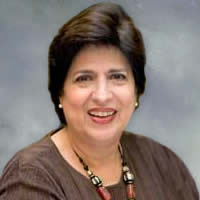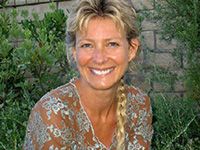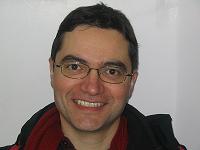Plenary Speakers
 |
Ofelia Garcia, Graduate Center of the City University of New York
Title: Translanguaging and Multilingualism in Schools (English Plenary)
This presentation proposes that the ways in which we think about language has consequences for the education of all students, and especially in the minoritization of some. Taking the standpoint that language is the widely distributed human capacity to relate to others and to ideas, and that language is not simply a discrete label such as English or French, we examine how this perspectival shift opens up spaces for pedagogical practices that expand the multilingual capacities of all language users. Besides clarifying the concept of translanguaging that underlies this framework, we give examples of how classroom teachers have taken up translanguaging to expand educational opportunities and multilingualism for all.
About the Speaker
Ofelia García is Professor in the Ph.D. programs of Urban Education and of Hispanic and Luso-Brazilian Literatures and Languages at The Graduate Center of The City University of New York. She has published extensively in the area of bilingualism, and among her best-known books are Bilingual Education in the 21st Century: A global perspective; and Translanguaging: Language, bilingualism and education (with Li Wei, 2015, BAAL Book Award recipient). García is the General Editor of the International Journal of the Sociology of Language, and the co-editor of Language Policy (with H. Kelly-Holmes). In 2016 García received an Honorary Doctorate of Humane Letters from Bank Street Graduate School of Education; in 2017 she received the Charles Ferguson Award in Applied Linguistics from the Center of Applied Linguistics, and the Lifetime Career Award from the Bilingual Education SIG of the American Education Research Association.
|
 |
Danièle Moore, Simon Fraser University
Title: (Mé)tissage, maillages de langues plurigraphies : Faut-il avoir peur du pluriel et de la complexité en didactique? (French Plenary)
On note depuis quelques années une floraison de concepts cherchant à mieux théoriser la complexité et le pluriel en didactique des langues. Ces nouveaux termes ne servent-ils qu’à dépoussiérer ou remettre à la mode des notions antérieures ? La contribution vise, d’une part, à donner quelques repères historiques sur la théorisation de la compétence plurilingue et pluri-/interculturelle (Coste, Moore & Zarate, 1997/2009), notamment dans le monde francophone, et discutera comment différents concepts entrent en écho (ou non) avec d’autres concepts circulant du champ (Marshall & Moore, 2016) pour, d’autre part, en discuter les potentialités pour repenser les compétences en langues, la recherche et l’enseignement. Plusieurs études, menées dans différents contextes éducatifs complexes, nous serviront de toile de réflexion pour mieux comprendre comment les apprenants tissent et maillent leurs langues, les distinguent ou les fondent, font sens de leurs pratiques et mobilisent, dans les espaces d’action qui sont leurs, des ressources plurilingues pour comprendre et apprendre.
About the Speaker
Danièle Moore est Professeure éminente (University Professor) à la Faculté d’Éducation de l’Université Simon Fraser à Vancouver, et Directeur de recherche à Paris 3 – Sorbonne Nouvelle à Paris. Ses recherches en sociolinguistique, en didactique des langues et en acquisition couvrent l’étude des plurilinguismes, l’analyse des interactions de classe, le développement plurilittératié et l’acquisition des langues tierces, dans différents contextes de contacts de langues et de cultures. Ses études les plus récentes incluent l’investigation de la transmission intergénérationnelle des langues dans un Programme de revitalisation des langues autochtones en Colombie-Britannique, du développement plurilittératié chez des enfants trilingues, et de l’inclusion sociale et scolaire d’enfants vulnérables et de leurs familles dans le système scolaire canadien et la communauté. Elle est l’auteure de l’ouvrage Plurilinguismes et école, paru à Paris aux Éditions Didier (Collection LAL, 2006), ainsi que de plusieurs études de référence pour le Conseil de l’Europe, notamment Compétence plurilingue et pluriculturelle (avec Daniel Coste et Geneviève Zarate, 1997 et 2009) et Valoriser, mobiliser et développer les répertoires plurilingues et pluriculturels pour une meilleure intégration scolaire (avec Véronique Castellotti, 2010). Elle est co-Éditrice avec Murray Munro de la Revue Canadienne des Langues Vivantes/The Canadian Review of Modern Language.
|
 |
Guillaume Gentil, Carleton University
Title: "Translanguaging and Multilingual Academic Literacies" How do we Translate that into French? Should we? (Bilingual Plenary)
Translanguaging, literacy, and derivatives (biliteracy, multiliteracies) are concepts that have been first developed in English and Welsh, and then variously adopted, resisted, and translated by the Francophonie. Examining such interrelated conceptual developments offers an interesting insight into the kind of translanguaging activities and challenges that French-speaking literacy educators, like other plurilingual scholars, must routinely engage in as they negotiate academic discourses across languages and modes, writing in French from English sources and vice versa. While we reflexively interrogate the translanguaging practices surrounding the concept of translanguaging as a case in point, we suggest the potential of this translanguaging work for developing a plurilingual approach to writing instruction that equips university students and scholars for professional and academic communication in a global world. In keeping with a translanguaging approach, the presentation will switch between English and French while offering written and visual support in the other language.
About the Speaker
Guillaume Gentil is Associate Professor in the School of Linguistics and Language Studies at Carleton University, Ottawa, Canada and former co-editor of the Journal of Second Language Writing, an international, peer-reviewed journal that publishes theory and research in second and foreign language writing and writing instruction. His research interests in second language writing and biliteracy development in professional and postsecondary settings originated from his academic literacy experiences in France, the USA, and Canada. This interest has resulted in several case studies and institutional ethnographies of academic and professional biliteracy over the last fifteen years with a threefold focus on multilingual writers’ motivations for biliteracy, individual and institutional strategies for biliteracy, and ways to design enabling contexts for biliteracy. This research work has appeared in Canadian Modern Language Review, Discourse & Society, Journal of English for Academic Purposes, Journal of Second Language Writing, Written Communication, and several co-edited books. The theoretical and programmatic piece “A biliteracy agenda for genre research,” originally published in JSLW, was reproduced in The Best of the Independent Rhetoric and Composition Journals, 2011.
|
|